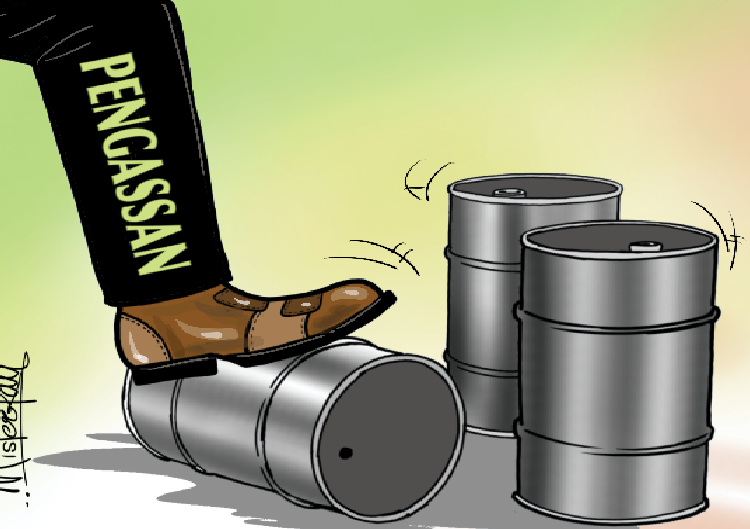Barring any last-minute change of plans, the oil sector will witness another disruption. The Petroleum and Natural Gas Senior Staff Association of Nigeria (PENGASSAN) is lurching towards an angry showdown over the abuse of expatriate quota.
The oil workers have an axe to grind with an Indian oil firm, Sterling Oil Exploration & Energy Production Company (SEEPCO) Limited, which they accused of preferring expatriates over qualified Nigerian workers.
PENGASSAN recently staged a protest at SEEPCO’s headquarters in Lagos, alleging a plethora of anti-labour practices and outright abuse of the oil firm’s expatriate quota. They accused the company of discriminating against skilled Nigerian workers in favour of Indian expatriates.
The firm refuted all the allegations, insisting that it was acting responsibly and in accordance with Nigeria’s extant laws. SEEPCO’s Media Specialist, Edith Afieroho, said in a statement that the firm adheres to Nigerian laws and industry regulations as a responsible corporate entity.
“Our unwavering commitment to the welfare of employees, host communities, and stakeholders enables us to maintain high standards in labour relations, environmental sustainability, and corporate governance.
“Further, in the context of specific allegations by PENGASSAN, we would like to clarify that Sterling Oil (SEEPCO) abides by the Collective Bargaining Agreement between Petroleum and Natural Gas Senior Staff Association of Nigeria (PENGASSAN), Industrial Act, and Laws of the Federal Republic of Nigeria to its letter and spirit.
“This intent has enabled SEEPCO to become the fastest growing indigenous company in the Oil and Gas Industry, and the Company will continue its contribution to Nigeria’s economic growth, creation of local jobs, and security in the energy sector by investing in local content development…We categorically refute any claims that misrepresent our dedication to fostering a fair and supportive working environment,” the firm said in reaction to PENGASSAN’s allegations.
Although SEEPCO vehemently denied the allegations, insisting that it was observing the nation’s expatriate quota in letter and spirit and reaffirmed its commitment to staff welfare, PENGASSAN has refused to sheathe its sword. It threatened to halt crude oil exploration unless the Nigerian government intervenes urgently to address SEEPCO’s alleged anti-labour practices.
The alleged infractions
Without any prevarication, the Nigerian government must urgently investigate PENGASSAN’s claim that SEEPCO employed more than 10,000 expatriates of Indian origins to fill positions meant for Nigerians. If SEEPCO did such a thing, it would be a clear violation of the Nigerian local content laws.
Other claims by PENGASSAN that need to be investigated urgently are that SEEPCO, in contravention of the Nigerian expatriate quota law, engaged foreign workers in middle—and low-level roles such as welders, vulcanizers, gatekeepers, cooks, and communication personnel.
Finding out whether or not the oil firm flouts the nation’s expatriate quota and ensuring that appropriate measures are taken is not just necessary but inevitable. The government must do this if not to address the injustice meted out to Nigerians in the face of high unemployment, then to avert a looming total shutdown of the oil and gas sector.
Although SEEPCO has denied PENGASSAN’s allegations, the refutal flies in the face of numerous instances where the firm is said to have been found wanting in one violation or another, making it difficult for anyone to dismiss the concerns raised by the oil workers outrightly.
Regulators’ reactions
In 2015, the Nigerian Oil Spill Detection and Regulation Agency -NOSDRA- secured a court judgment ordering SEEPCO to pay a fine of N68 million for failure to report an oil spill.
The judgement delivered by a High Court sitting in Asaba, Delta State, followed an oil spill incident at the Okwuibome Location (OPL 280), where the court held that SEEPCO breached the NOSDRA Act 2006. NOSDRA commenced the legal action against SEEPCO on Feb. 17, 2012.
The Nigerian Content Development Monitoring Board (NCDMB) also noted that SEEPCO had previously faced sanctions for breaching Nigerian content laws. In 2017, the Board penalised the company after discovering five expatriates working without necessary approvals.
As if reminding Nigerians of how notorious SEEPCO is for flouting the nation’s law, the NCDMB recalled how the oil firm repeatedly contravened local content laws. The Board said that in 2018, SEEPCO illegally deployed 402 expatriates and executed unauthorised projects.
“In response to the infractions, the Board imposed penalties and ordered the company to disengage the expatriates and provide proof of their exit, follow proper expatriate quota application processes, adhere to NCDMB’s rules on tendering and awarding contracts, reconcile and pay outstanding remittances to the Nigerian Content Development Fund (NCDF), and train and employ 40 Nigerians as remediation”.
However, the Board noted that SEEPCO ignored these directives, prompting the Board to initiate legal proceedings under Section 68 of the NOGICD Act.
The NCDMB noted that in 2020, SEEPCO sought an out-of-court settlement and committed to addressing the compliance issues and undertaking the remediation. SEEPCO completed the training of 40 Nigerians in 2022, but the employment commitment was not achieved. Additionally, SEEPCO made only partial national content development fund remittances.
In fact, NCDMB accused SEEPCO of refusing to respond and comply with other Nigerian Content requirements. The unanswered question remains: what happens? Is the NCDMB helpless? How was it possible for the firm to flout the expatriate quota, assuming without conceding that it does and without being noticed by relevant authorities? How did we get to a stage where workers are accusing a firm that is supposed to operate under strict regulations of allegedly indulging in such a barefaced disregard for the nation’s laws?
In India, the home country of SEEPCO owners, there are vibrant local content laws that aim to promote Make in India by prioritising goods and services with a certain percentage of local value addition. If SEEPCO were to operate in India, I doubt it would flout any of such laws.
Nigerian law, specifically section 35 of the NCDMB Act, mandates that all operators in the nation’s oil and gas sector employ only Nigerians in junior and middle-level roles. To what extent has such a provision been observed in the breach? Is the NCDMB doing enough to address this?
Why action matters
According to a 2023 report by the global youth unemployment index, Nigeria’s 53 per cent unemployment rate makes it the nation with the second-highest number of unemployed youths in the world, behind only South Africa, with 61 per cent youth unemployment.
The increasing lack of job opportunities for young people has worsened the nation’s unemployment crisis, fueling a steep rise in the number of youths emigrating to other countries in search of the proverbial greener pasture.
The nation’s economy is heavily reliant on the oil sector, which offers limited employment opportunities, which are made worse by the abuse of expatriate quotas by some players in the sector.
It is simple. The Nigerian government must do what is necessary. And that is to beam its searchlights on not just SEEPCO but other companies operating in the country to ascertain the extent to which they obey or breach the nation’s labour laws.
The federal government’s resolve to review the expatriate quota policy to ensure transparency and accountability is a step in the right direction. Though it is coming late, it is, as is often said, better late than never. The process of issuing approvals for expatriate quotas needs to be radically overhauled. There is clear systemic abuse. The government must address the widespread allegations that many companies abuse expatriate quotas, especially in the oil and gas sector.





